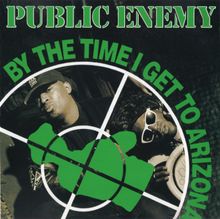By the Time I Get to Arizona (1991)
By the Time I Get to Arizona is a song written and performed by American hip hop group Public Enemy from their 1991 album Apocalypse 91... The Enemy Strikes Black. Public Enemy frontman Chuck D wrote the song during the protest of the state of Arizona, where governor Evan Mecham had canceled Martin Luther King Jr. Day and the people voted against its reintroduction.[1]
The song was released as a B-side to the single "Shut 'Em Down" in January 1992 with its own music video. The video was stirred up public attention for its portrayal of black paramilitaries murdering Arizona politicians in revenge for King, who was non-violent. Some black activists and King's widow Coretta Scott King neglected the themes that was used for the video. Chuck D and Public Enemy's spokesman Harry Allen defended the video as a fictional revenge for King's assassination.[2]
Contents
Key Lyrics
Twenty-thousand niggy-niggy brothers in the corner
Of the cell block, but they come from California
Population is none in the desert and sun
With a gun cracker runnin' things under his thumb
Starin' hard at the postcards, isn't it odd and unique
Seein' people smile wild in the heat?
A hundred-twenty degree, 'cause I want to be free
What's a smilin' face when the whole state's racist?
Background
Public Enemy frontman Chuck D wrote the song in protest at the state of Arizona, where Governor Evan Mecham had canceled Martin Luther King Jr. Day and the people of the state voted against a proposition to reintroduce it. Backlash to this decision included the NFL moving Super Bowl XXVII to California, losing around $100 million in revenue for Arizona.[3]
In the lyrics of the song, Chuck D says "neither party is mine, not the jackass or the elephant", indicating that he and the black community will not challenge Arizona by voting for the Democratic or Republican parties represented by those mascots.[4]
Reception
A 2020 list in the Phoenix New Times named it among the 27 best songs about Metro Phoenix, calling it "harshest critique of Arizona, and with good measure".[5] In February 2014, around the time of controversial LGBT-related Arizona SB 1062, Christopher Federico of The Washington Post chose the song for "The week in one song".[6]
Chuck D and academic Gaye Theresa Johnson co-authored a 2010 article for The Huffington Post in which they said that the anti-black racism decried in the song still existed in Arizona politics but directed toward Hispanic immigrants through Arizona SB 1070.[7] In 2011, amidst the backdrop of the same immigration legislation, Chuck D collaborated with painter Ravi Dosaj for an artwork based on the song.[8] The song's title was used for a 2012 paper on young Mexican Americans in Arizona and their experiences with racism.[9]
The song was on the soundtrack for 2002 video game Tony Hawk's Pro Skater 4.[10]
Reference
- ↑ By the Time I Get to Arizona. Wikipedia. Retrieved February 1, 2021.
- ↑ "Public Enemy's Lasting Tribute To Martin Luther King, Jr". 4 April 2018. The Source. Retrieved February 1, 2021.
- ↑ Evan Serpick. "Public Enemy Look Back at 20 Years of 'By the Time I Get to Arizona'". 10 November 2011. Spin. Retrieved February 1, 2021.
- ↑ Karyn Charles Rybacki and Donald Jay Rybacki. "Cultural approaches to the rhetorical analysis of selected music videos". 1999. Trans: Revista Intercultural de Música. Retrieved February 1, 2021.
- ↑ David Accomazzo, Brent Miles, and Tanner Stechnij. "The 27 Best Songs About Metro Phoenix". 6 May 2020. Phoenix New Times. Retrieved February 1, 2021.
- ↑ Christopher Federico. "'By The Time I Get To Arizona': The week in one song". 28 February 2014. The Washington Post. Retrieved February 1, 2021.
- ↑ Chuck D and Gaye Theresa Johnson. ""By the Time I Get to Arizona" — This Discrimination Must Stop". 26 June 2010. The Huffington Post. Retrieved February 1, 2021.
- ↑ "Chuck D premieres 'By the time I get to Arizona' art piece, talks politics and art". 13 March 2011. The Los Angeles Times. Retrieved February 1, 2021.
- ↑ Julia Cammarota and Michelle Aguilera. "'By the time I get to Arizona': race, language, and education in America's racist state". 2012. Race Ethnicity and Education. 15 (4): 485–200. doi:10.1080/13613324.2012.674025. S2CID 143538787. Retrieved February 1, 2021.
- ↑ "Activision Announces Explosive Sountrack For Tony Hawk's Pro Skater™ 4". 16 October 2002. Activision. Retrieved February 1, 2021.
